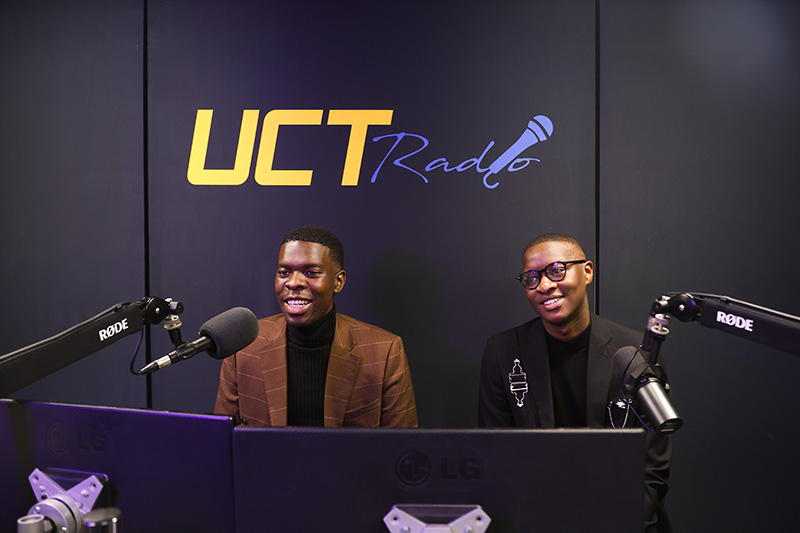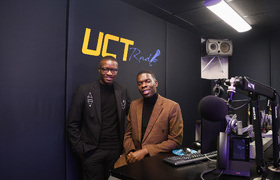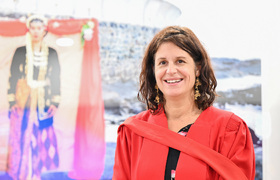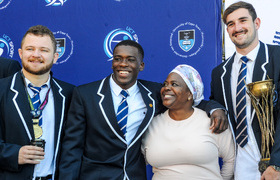UCT Radio: The future is fully digital
29 May 2025 | Story Kamva Somdyala. Video Production Team Boikhutso Ntsoko, Ruairi Abrahams and Nomfundo Xolo. Photos Je’nine May. Read time 4 min.The University of Cape Town’s (UCT) on-campus station, UCT Radio, have changed gear and embraced a fully digital future of their offering, according to programming manager, Clarence Ntini; and marketing manager, Jack Aphelele.
An invite from a UCT Radio page on social media read, “We’re saying goodbye to old-school traditional FM broadcasting and going FULLY digital! Catch us on our stream and all your fave digital platforms.” The launch happened on 8 May.
The switch has elicited a lot of excitement within the team as they march forward with a digital offering that “meets the listeners where they are”. Much has happened to get to this point, including COVID-19, which significantly disrupted their operations and listenership to a point where change was inevitable.
“Getting back into the swing of things was difficult because listenership and interest had gone down. In trying to get the station back to where it was, I returned to try my hand at management. Because we had been doing remote broadcasting during COVID-19, that helped in understanding where to focus on going forward – namely, the online market. There were multiple issues facing us, including having our FM licence revoked, and so the opportunity presented itself to go fully digital,” Ntini told UCT News from the radio’s studio on upper campus.

With the digitisation process, the team needed to go backwards to go forward, and with the guidance of station coordinator, Natalie Brandreth, the question which existed, according to Aphelele, was whether they needed to keep their FM bandwidth. Doing away with their FM bandwidth was motivated by their primary audience (students and youth at large) with regards to where they spend most of their time: the digital world of social media.
“The one consideration was that people would listen to the radio while driving to campus, but we felt that the student population with cars was dwindling, and at residences one isn’t inclined to listen to FM because one doesn’t have access to a radio, but with a smartphone and other materials at one’s disposal (including taking public transport or a break from class) it becomes easy to stream rather than search for our frequency. We felt perhaps FM is not for us anymore and we should look into going digital … We looked at what does that mean for UCT radio,” said Aphelele.
Extensive network
Additionally, because UCT is an extensive network with international students and academics, they too can now continue to enjoy UCT Radio’s offerings from anywhere in the world. The radio jockeys discussed how they engage in a variety of ways because they understand UCT is a research-based university with experts they can speak to on a range of topics. The station has started a politics podcast, as well as one for pop-culture and lifestyle, in the hope that listeners find their interests expressed on UCT Radio platforms.
“We are keeping the programming as it is for now because we are still looking at it from a development approach.”
Aphelele continued: “We investigated podcasts, TikTok, our website and our app to get to a position where we give students what they want. Digitisation is finding students where they are and giving students content where they are.”
UCT Radio describes itself as “a student-run, campus community station [whose] programming reflects the culture, ethos and diversity of campus life, following a cross-genre approach to music and playing 90% of South African music. UCT Radio actively engages with an audience best described as aspirational youth with a strong desire to succeed in their careers, finances and personal lives but with enough of a social conscience to reinvest in their communities.
Their current blueprint will not change their overall objectives, Ntini maintained. He said, “We are keeping the programming as it is for now because we are still looking at it from a development approach – in that, being able to still teach budding presenters radio rules and skills with the addition of digital skills and rules for broadcasting. We’re also looking at infusing our podcasts into programming, because they are currently on online platforms, but we will bring them on air so that people can also learn more about our other offerings through listening.”
A radio station – with more
Ntini added: “The biggest thing about the station is to develop broadcasting talent. The media industry is seeing a growth in podcasting and so that is what we have integrated in our training. We are keeping the radio side as it’s still an important medium. At the end of the day, it’s about evolving with the time. Now I hope the presenters that come through are coming with the mindset of growing themselves with content creation that is substantial.”
The station has noted that people’s approach to radio has changed. Years ago, talent would walk through the door with the sole purpose of using the station as a springboard to just commercial radio. “Nowadays, we have influencers who are giving a different point of view and therefore we also need to look at the studio and infrastructure and how it can best serve them. We are keeping in mind that people want to become content creators after this, so our work needs to factor that in mind – in a smart way,” Aphelele concluded.
The final call to action from Aphelele was to agency companies, public relations (PR) companies, and advertising companies to embrace this digital transformation and trust them with advertising and campaigns, because currently they are a bit sceptical about this move to fully digital. “We still are a radio station, with just a bit more. So, to marketing and PR companies: this can still work.”
- Get your daily dose of UCT Radio.
- Podcasts are available on YouTube, Spotify and Apple Podcast
- For more information, contact: 021 650 5399.
 This work is licensed under a Creative Commons Attribution-NoDerivatives 4.0 International License.
This work is licensed under a Creative Commons Attribution-NoDerivatives 4.0 International License.
Please view the republishing articles page for more information.












